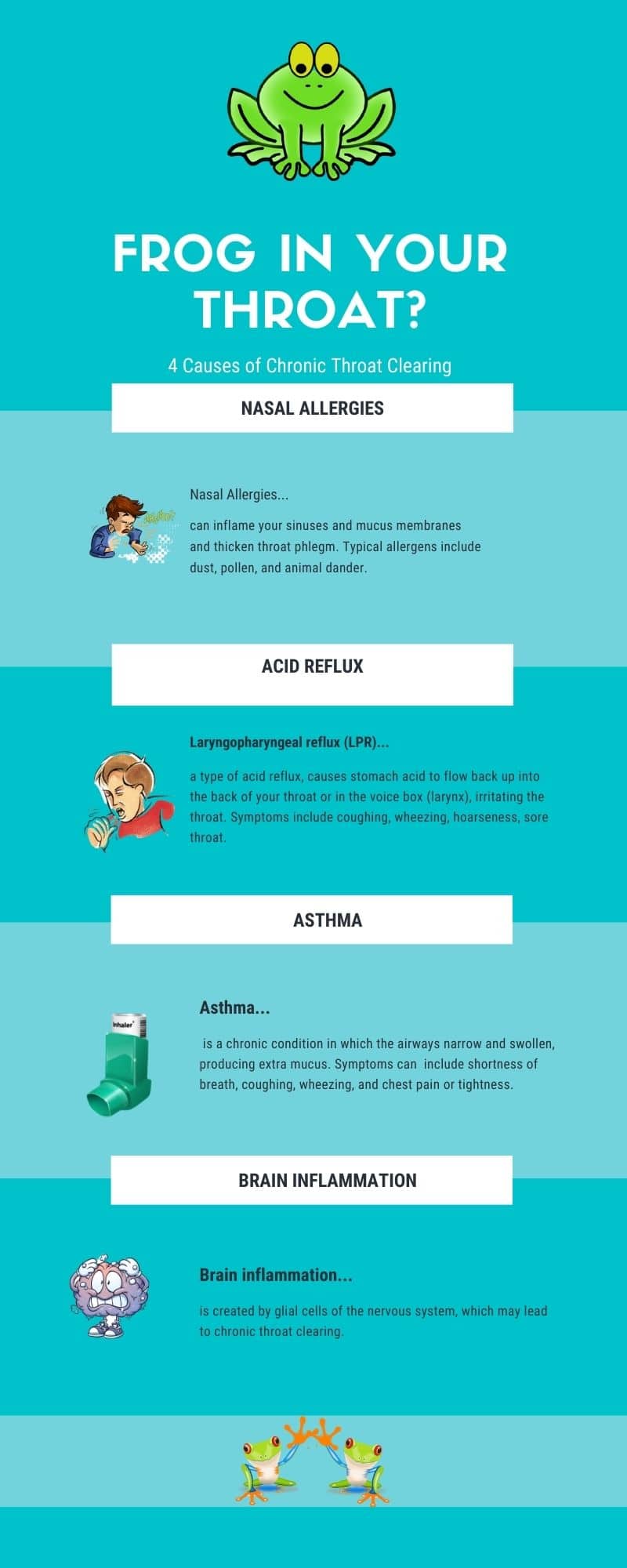Constant Throat Clearing: Causes and Solutions
Everybody clears their throat on occasion. Throat clearing is an instinctive effort to remove an irritant in the throat. This irritant can be real, or it may just create a feeling of something being stuck or needing to be cleared. It can also be a habit you’ve picked up along the way.
There are many causes of constant throat clearing, ranging from common colds to reflux and allergies.
Throat clearing is usually harmless, but if it happens frequently, you should investigate the cause. Excessive throat clearing is a symptom that may indicate an underlying issue. After all, chronic throat clearing can irritate the throat, leading to hoarseness and trouble swallowing. It can also be a sign of a medical condition.
Read on to discover some of the most common causes of chronic throat clearing along with solutions.
Constant Clearing Throat: What’s it All About?
When you clear your throat, you use your throat muscles to expel the irritant. Put simply, you vibrate your vocal chords violently to clear your throat. This action can cause throat pain and irritation, and if it occurs frequently, it can damage the vocal chords. Frequent throat clearing can also irritate the vocal folds, leading to further discomfort and a cycle of persistent throat clearing.
And the irritant you’re constantly trying to clear is most often phlegm, also called mucus.
Key to Clearing Throat
The key to clearing your throat is to discover the cause of the phlegm. Once you’ve determined the cause, you can proceed to the solution.
So let’s discuss some causes and solutions for phlegm in the throat.
If the most common causes are ruled out, other possibilities such as neurological or behavioral factors should be considered.
Causes of Constant Phlegm in Throat
Phlegm is quite common, normal, and required for proper bodily function. Your body produces about 1 to 1.5 liters of mucus per day.1
Many patients experience clusters of symptoms such as throat clearing, cough, and globus sensation—a feeling of a lump or foreign body in the throat that often co-occurs with throat clearing.
Mucus “oils the engine” so to speak, lubricating your tissues and keeping them from drying out. It also contains antibodies and enzymes that identify and destroy bacteria and germs. This sticky goo even traps dust and germs before they make their way into the rest of your body.2 (The airways are the primary entry point for airborne pathogens and environmental toxins.)
Phlegm is produced by tissue in your throat, lungs, mouth, nose, sinuses, and gastrointestinal tract. Most of the time this mucus drips down your throat unnoticed. But certain conditions can cause the consistency to change, commanding both attention and throat clearing.
Here are a few of the most common causes of persistent phlegm in throat:
- Post-nasal drip, which can be caused by allergies, sinus infections, or respiratory illnesses, leading to throat irritation.
- Dietary triggers, such as dairy or spicy foods, which may contribute to throat discomfort and increased mucus production.
- Gastroesophageal reflux disease (GERD) or gastric reflux, which can cause symptoms like heartburn, indigestion, and sore throat.
- Certain medication, including ACE inhibitors, are known to cause throat clearing as a side effect that may persist even after long-term use.
- Swallowing disorders, such as dysphagia or difficulty swallowing, which may be associated with throat clearing and globus sensation.
- Other symptoms that may accompany throat clearing and warrant further evaluation include difficulty, voice changes, and swallowing disorders.
These conditions can often be treated with appropriate medication and lifestyle changes. It is important to treat the underlying cause to effectively manage persistent throat clearing. If a patient experiences symptoms such as dysphagia, difficulty swallowing, voice changes, or persistent globus sensation, they should seek medical evaluation to ensure proper diagnosis and management.
Nasal Allergies
Nasal allergies occur when the immune system overreacts to substances (allergens) in the environment that are typically harmless. Typical allergens include:
- Dust
- Pollen
- Animal dander
- Dust mites
- Some molds
These allergens can inflame your sinuses and mucus membranes and thicken throat phlegm, leading to frequent throat clearing. This phlegm can also drip down the back of the throat (post-nasal drip) causing hoarseness, sore throat, and painful swallowing.
Symptoms of nasal allergies include:
- Runny or stuffy nose
- Sneezing
- Itchy nose or eyes
- Post-nasal drip
- Throat clearing
Treatment
Treatments for nasal allergies include:
- Antihistamines
- OTC Decongestants
- Steroidal nasal sprays that reduce inflammation of nasal passageways
- Allergy shots to help your body build up a tolerance to the allergen
Having a treatment can still involve quite a bit of suffering and throat clearing, however. So the best course of action is to avoid the allergen if possible.
Acid Reflux
Laryngopharyngeal reflux (LPR), a type of acid reflux, is also known to cause chronic throat clearing.
In LPR, stomach acid flows backs up into the back of your throat or in the voice box (larynx), irritating the throat. Unlike gastroesophageal reflux disease (GERD), LPR doesn’t cause heartburn. For this reason, LPR is known as “silent reflux”.
GERD and LPR can co-exist. In fact, more than half of the people with GERD may also develop symptoms of LPR.3
Symptoms of LPR include:
- Cough
- Wheezing
- Hoarseness
- Sore throat
Treatments
Treatments for either type of acid reflux disease include:
- Antacids
- Proton pump inhibitors
- Losing weight (if overweight)*
- Avoiding reflux-triggering foods
- Quitting smoking
*Losing weight (if overweight) is a key strategy for managing acid reflux, as excess weight can increase pressure on the stomach, worsening symptoms. For certain individuals with obesity, weight loss drugs may be recommended by healthcare providers to support weight management and alleviate reflux-related issues.
Asthma
Asthma is a chronic condition in which the airways narrow and swell, producing extra mucus. The causes of asthma are unknown at this time, but genetic or environmental factors are thought to play a role.
Symptoms of asthma vary widely but can include:
- Shortness of breath
- Coughing
- Wheezing
- Chest pain or tightness
Treatments
Treatments vary widely depending upon the type or severity of asthma. Some of the treatment options include:4
- Long-term medications taken daily to control asthma symptoms. These include oral medications and inhalers.
- Rescue medications offering quick relief of symptoms. Most rescue medications are inhalers that relax the airways to promote easier breathing. But they also include oral and intravenous corticosteroids for severe asthma flareups.
- Biologic medications specifically designed for those who suffer from severe asthma attacks
In addition to prescribed asthma treatments, weight loss can help improve lung function and reduce asthma symptoms, especially in individuals with obesity. Consequently, healthcare providers may recommend weight loss drugs for compatible patients as part of a broader treatment plan to manage asthma more effectively.
Keep in mind, though, that severe asthma attacks can be a medical emergency. Thus, you should work with your doctor to develop an action plan for your asthma attacks.
Neurological Inflammation
Though neurological inflammation is not often considered one of the causes of throat clearing, it may indeed play a role. While acute brain inflammation is associated with injury or pathogens and constitutes a medical emergency, e.g. meningitis, chronic brain inflammation is different. Its symptoms are subtle and can lead to a host of seemingly unrelated health conditions.
Symptoms of brain inflammation can include mental fatigue, brain fog, and memory problems.5 Health conditions associated with neuroinflammation include:6, 7
- Anxiety
- Depression
- Alzheimer’s disease
- Parkinson’s disease
- Schizophrenia
- Bipolar disorder
And now there is scientific evidence that brain inflammation may be linked to persistent throat clearing and/or coughing.
In a 2020 observational study published in the European Respiratory Journal, researchers discuss the evidence that the inflammation seen in chronic cough may involve neuroinflammation. That’s because studies suggest that neuroinflammation is created by glial cells of the nervous system, cells that may also play a role in chronic pain. (Chronic pain and cough share a similar manner of development.) 8
And chronic cough, of course, also leads to chronic and persistent throat clearing.
Emerging research also suggests that, for certain individuals, weight loss drugs, particularly those targeting metabolic pathways, may have indirect effects on reducing systemic inflammation, potentially influencing neuroinflammation and associated symptoms like chronic throat clearing.
Brain inflammation is often caused by poor-quality diet and poor nutrition. But the good news is that it can be reversed through eating healthy foods and taking supplements that include brain-healing nutrients.
Habitual Behaviors and Throat Clearing
Habitual throat clearing often develops when the act of clearing your throat becomes an automatic response to even minor irritation or the sensation of a lump in the throat. Over time, this can create a cycle where the more you clear your throat, the more irritation you cause, leading to even more frequent throat clearing. Common triggers for habitual throat clearing include postnasal drip, acid reflux, or even stress.
Breaking this cycle starts with recognizing when and why you’re clearing your throat. Consulting a medical professional can help you identify the underlying cause—whether it’s reflux, allergies, or another issue—and guide you toward effective treatment options. Speech therapy is often recommended for those struggling with habitual throat clearing, as it can teach techniques to suppress the urge and protect your vocal cords. Additionally, making dietary changes to avoid foods that trigger acid reflux or postnasal drip can reduce irritation. Being mindful of your throat clearing and making a conscious effort to stop can go a long way in breaking the habit and restoring throat comfort.
Environmental Factors Affecting Throat Health
Your environment plays a significant role in throat health, and exposure to irritants like smoke, air pollution, and strong fragrances can lead to chronic throat clearing. These substances can inflame the lining of your throat, causing excess mucus production and ongoing irritation. If you find yourself constantly clearing your throat, consider your surroundings—smoking or being around second-hand smoke, for example, is a common cause of chronic throat irritation.
To protect your throat, try using an air purifier at home, avoid areas with heavy pollution, and steer clear of strong chemicals or perfumes. Keeping your living space free from dust and allergens can also help. Staying hydrated by drinking plenty of water and using a humidifier to add moisture to the air can soothe your throat and reduce the urge for chronic throat clearing. Small changes in your environment can make a big difference in reducing throat symptoms and improving your overall comfort.
How to Clear Your Throat Naturally
One of the best ways to naturally clear your throat of phlegm is to eat a nutritious diet or take supplements that naturally contain anti-inflammatory vitamins and other substances, as this can reduce inflammation in your sinuses, nasal passages, and throat. It can also help reduce brain inflammation.
Here are the best nutrients clinically shown to help reduce brain inflammation, which may in turn help you clear your throat naturally.
Vitamin D
This fat-soluble vitamin promotes calcium absorption and is essential for bone growth. Turns out, it’s also a powerful anti-inflammatory.
In a recent review of 30 studies on vitamin D, researchers noted:
“Studies consistently reported results showing that vitamin D supplementation can downregulate inflammatory pathways of COX-2, TNF-α, NF-κB, and MAPK.”9
And it can soothe brain inflammation. According to multiple scientific studies, vitamin D can pass through the blood-brain barrier and thus influence the central nervous system (brain and spinal cord) via its receptors. 10 Vitamin D deficiency is also associated with impaired cognitive function.11
Acetyl-L-Carnitine
Acetyl-L-Carnitine (ALC) is a naturally occurring micronutrient known for its neuroprotective properties. For example, studies suggest that supplementing with ALC may fight off neuronal degeneration and prevent age-related cell death throughout the brain.12
In other words, supplementing with ALC could reduce brain inflammation, making it a great solution for chronic throat clearing.
Omega-3 Fatty Acids and Fish Oil
Research indicates that omega-3 fatty acids have potent anti-inflammatory properties.13 They can help your body fight inflammation in your throat, nasal cavity, and other areas, thus relieving the urge to clear your throat.
Fish oil is one of the best sources of omega-3 fatty acids. This is probably the reason multiple research studies indicate that fish is a powerful anti-inflammatory.
For example, one pre-clinical research study showed that a diet enriched with 20% fish oil decreased mucus production and the inflammatory response in mice.14
Citicoline
Citicoline is a naturally occurring chemical found in every cell of your body, especially the brain.
Studies indicate that citicoline provides significant neuroprotection due in part to its ability to defend against free radical damage in brain cells.15 Once in the brain, citicoline is also partially converted to acetylcholine, an important neurotransmitter.
Research suggests that acetylcholine receptors calm the inflammatory response in the brain, thus supporting healthy brain function. This can also minimize throat clearing.
Nutrition and Hydration for Throat Comfort
What you eat and drink can have a big impact on chronic throat clearing. A diet rich in fruits, vegetables, and whole grains supports overall throat health and helps reduce inflammation. Avoiding foods that are spicy, acidic, or rough—such as citrus fruits, tomatoes, and heavily seasoned dishes—can prevent further irritation and help manage symptoms.
Hydration is equally important. Drinking plenty of water keeps mucus thin and your throat moist, making it easier to swallow and less likely to feel the need to clear your throat. Warm liquids like herbal tea or broth can be especially soothing, helping to calm inflammation and ease discomfort. If you’re struggling with chronic throat clearing, a healthcare professional can offer personalized dietary advice to help you manage symptoms and maintain a healthy throat.
When to Seek Help for Persistent Throat Clearing
If you find yourself clearing your throat constantly for several weeks, it’s time to consult a medical professional. Persistent throat clearing can be a symptom of underlying conditions such as gastroesophageal reflux disease (GERD), chronic sinusitis, or laryngopharyngeal reflux. These conditions often require specific treatment to resolve the root cause and prevent further irritation.
A doctor can perform a thorough diagnosis to determine what’s causing your symptoms. Early intervention is key—addressing the underlying cause of throat clearing not only relieves discomfort but also helps prevent complications like vocal cord damage or chronic cough. Don’t ignore ongoing symptoms; seeking help ensures you get the right treatment and support for your throat health.
Diagnostic Evaluation: Getting to the Root Cause
Getting to the bottom of chronic throat clearing starts with a comprehensive diagnostic evaluation. When you visit a medical professional, they’ll begin by taking a detailed medical history, asking about your symptoms, lifestyle, and any environmental exposures that could be contributing to your chronic throat issues. A physical examination of your throat and nasal passages is often performed to look for signs of irritation or infection.
Depending on your symptoms, your doctor may recommend diagnostic tests such as endoscopy or imaging studies to check for conditions like GERD, chronic sinusitis, or laryngopharyngeal reflux. Allergy testing may also be suggested, and in some cases, you might be referred to an ear, nose, and throat (ENT) specialist for further evaluation. This thorough approach helps pinpoint the underlying cause of your throat clearing, allowing for a targeted and effective treatment plan tailored to your needs.
Vitaae: A GREAT Way to Reduce Throat Clearing
The 4 nutrients above are the best nutrients for brain health. But you don’t have to purchase them separately. You can get all of these scientifically proven nutrients in a 4-in-1 Brain Health Solution! This breakthrough patented BRAIN BOOSTING formula contains the most absorbable forms and therapeutic doses of each nutrient, making it easy to get the nutrients that are ESSENTIAL for your brain to stay healthy and sharp as you age…and fix chronic throat clearing at the same time! Click here to learn more about Vitaae and to place your order today!









